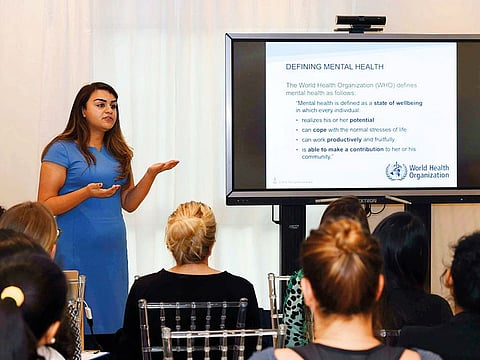How to spot mental health issues and what to do
You can’t 'cure' a person with mental health issues, but you can offer healing

Dubai: Nothing can prepare you for that message or call to tell you a loved one has committed suicide after years of battling depression. So when it comes, questions flood your head. Why did they do it? How could I have prevented them from ending their life? What could I have done differently? Why didn’t I spot the signs?
Self-blame is a normal human reaction but it is not the answer, say mental health experts. Depression and other mental health issues may be one of the most misunderstood conditions worldwide.
They can happen to anyone. Often, the signs stare you in the face yet the untrained eye can’t spot them.
“Usually when we think of something who’s struggling with mental health problems, we imagine them to have a dark cloud above them or for them to be crying in the corner, and sometimes that is how that person may appear. But usually that’s not the case,” said Farah Dahabi, a clinical social worker at Lighthouse Arabia, during a recent Mental Health First Aid information session in Dubai.
Usually when we think of someone who’s struggling with mental health problems, we imagine them to have a dark cloud above them or for them to be crying in the corner, and sometimes that is how that person may appear. But usually that’s not the case.Farah Dahabi, Clinical social worker
“Usually that person is very high performing, funny and bubbly. Depression is quite an invisible disease. It’s kind of hard to detect and yet it’s extremely common.”
According to the World Health Organisation (WHO), one in four people will struggle with mental health or neurological disorders at some point in their lives.
There is no data on people with mental health issues in the UAE. But going by World Health Organisation (WHO) statistics, it is more common than most people think.
Anxiety, depression, adjustment difficulties and relationship issues are common in the UAE, according to Lighthouse Arabia’s mental health primer. All the transitions, challenges and even financial troubles, expatriates face can be overwhelming.
Sadly, nearly two-thirds of those with depression or other known mental health issues never seek help from a health professional, WHO reports. The reasons are many — stigma, discrimination and neglect, and lack of awareness on who to turn to.
Instead, they turn to friends or a listening ear. While this is normal, it is not always the solution.
“When it comes to responding to someone who is struggling with depression or anxiety, the average person cannot try to fix it because that is the job of the professionals to really understand what that person is going through. They need proper care.”
“In our friendships, we try to fix the issue, we try to give advice, we try to make them feel better. But a first aider does not take responsibility. It’s about listening non-judgmentally with empathy. And that’s a skill.”
Anyone would know that a drowning person needs help. But a person drowning in depression may not always have obvious warning signs.
Knowing what to do and when to do it during a mental health crisis is crucial. Mental health first aid is just as important as physical first aid in saving a life.
“When we know better, we do better,” Dahabi said, adding that since launching mental health first aid in Dubai in 2017, Lighthouse Arabia has trained 600 mental health first aiders.
“Our dream is that mental health will be prioritised in the same way physical health is in the UAE and by making one in 10 people, or having one in every group trained in mental health first aid. We really hope to make mental health more accessible to everyone.”
Darkness into Light
Four simultaneous 5-km walks will be taking place in Abu Dhabi, Dubai, Al Ain and Ras Al Khaimah from 3.45am on Saturday May 11 in order to raise awareness of mental health issues in collaboration with the Al Jalila Foundation. First started in Dublin, Ireland in 2009, the annual dawn walk in aid of mental health has now gone global with 200,000 taking part across 150 locations last year. UAE events this year will be taking place at Emirates Palace, Abu Dhabi; Kite Beach, Dubai; Green Mubazzarah Park, Al Ain and Al Marjan Island, Ras Al Khaimah.
How to spot signs through the mental health continuum
Throughout our life, we go through a series of experiences that could affect our mental health. The mental health continuum is a spectrum of mental health, where an individual fluctuates from left to right depending on internal or external factors. Those on the right need professional help.
Sign up for the Daily Briefing
Get the latest news and updates straight to your inbox




